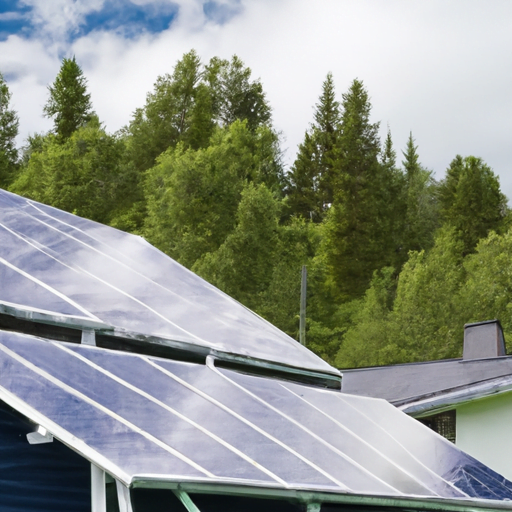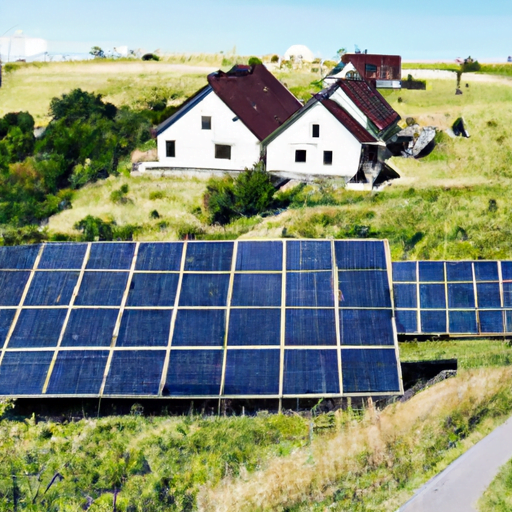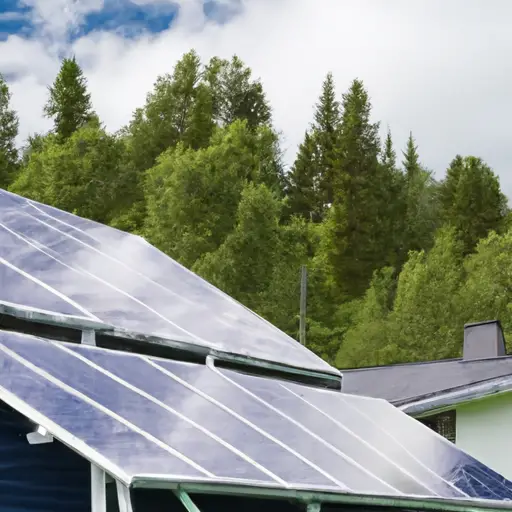So, you want to live off the grid, huh? That’s pretty cool! No more relying on traditional power sources and dealing with high energy bills. But have you ever wondered if you need solar panels and a heat pump for off-grid living? Well, the short answer is, it depends. But don’t worry, I’m here to break it down for you.
Solar panels are a fantastic option for off-grid living. They harness the power of the sun to generate electricity, meaning you can say goodbye to those pesky energy bills. Not to mention, solar panels are environmentally friendly and renewable, so you’ll be doing your part for the planet too. And the best part? Solar panels can provide you with a reliable source of power even in remote areas.
Now, let’s talk about heat pumps. These nifty devices can efficiently heat or cool your living space using renewable energy sources like the sun, air, or water. With a heat pump, you won’t have to rely on traditional heating fuels like oil or gas. Plus, they can also be used to heat your water, further reducing your dependence on non-renewable resources. So, if you want a comfortable and sustainable off-grid living experience, a heat pump could be a great addition to your setup.
In conclusion, while it’s not absolutely necessary to have solar panels and a heat pump for off-grid living, they certainly have their benefits. Solar panels can provide you with a reliable source of electricity while being environmentally friendly, and heat pumps can keep your living space comfortable and sustainable. So, if you’re ready to take the plunge into off-grid living, consider adding these technologies to your setup. Stay tuned for our next article, where we’ll dive deeper into the pros and cons of these systems.

Off-Grid Living
Living off the grid refers to relying on self-sufficient and sustainable energy sources, such as solar panels and heat pumps, instead of traditional electricity and heating systems provided by utility companies. This lifestyle has gained popularity in recent years, as more people recognize the advantages of reducing their carbon footprint and becoming more self-reliant. In this article, we will explore the benefits of using solar panels and heat pumps for off-grid living, as well as the challenges and considerations that come with it.
Understanding Off-Grid Living
Off-grid living means disconnecting from the electrical grid and producing your own energy. This can be achieved through various sustainable methods, such as solar power, wind turbines, hydropower, and geothermal systems. By generating your own energy, you become less dependent on utility companies and reduce your reliance on non-renewable resources.
Advantages of Off-Grid Living
There are several advantages to living off the grid. Firstly, it allows you to become more self-sufficient and independent. You are no longer at the mercy of utility companies and any potential blackouts or price hikes. Additionally, off-grid living can significantly reduce your carbon footprint, as renewable energy sources produce far less greenhouse gas emissions compared to traditional energy sources.
Furthermore, off-grid living promotes a more sustainable lifestyle. By relying on renewable energy, you contribute to the preservation of natural resources and help combat climate change. This lifestyle also encourages minimalism and reduces unnecessary consumption, creating a healthier and more environmentally-friendly way of living.
Challenges of Off-Grid Living
While off-grid living offers numerous benefits, it also presents certain challenges. One of the main challenges is the initial investment required to set up a self-sufficient system. Solar panels, heat pumps, and other renewable energy solutions can be expensive to install. However, it is important to consider the long-term savings and return on investment that come with these systems.
Another challenge is the fluctuation in energy production. Solar panels, for example, rely on sunlight for energy generation, meaning energy production can vary depending on weather conditions. This requires careful planning and consideration to ensure a consistent and reliable energy supply. Additionally, off-grid living requires more effort and maintenance compared to traditional systems. Regular maintenance of solar panels and heat pumps is necessary to ensure optimal performance and longevity.
Importance of Sustainable Energy Sources
In today’s world, where climate change and environmental degradation are pressing issues, the importance of sustainable energy sources cannot be overstated. Transitioning to renewable energy, such as solar panels and heat pumps, is a crucial step towards reducing our carbon footprint and preserving the planet for future generations.
Solar Panels for Off-Grid Living
Introduction to Solar Panels
Solar panels are devices that convert sunlight into usable electricity. They consist of photovoltaic cells that capture sunlight and convert it into direct current (DC) electricity. This electricity is then converted into alternating current (AC) through an inverter, making it suitable for powering appliances and electrical systems.
How Solar Panels Work
Solar panels work by utilizing the photovoltaic effect. When sunlight hits the cells in the solar panel, it excites the electrons in the cells, causing them to flow and create an electric current. This current is then stored in batteries or used to power immediate energy needs.
Benefits of Solar Panels for Off-Grid Living
There are several benefits to using solar panels for off-grid living. Firstly, solar panels provide a sustainable and renewable source of energy. Solar power is abundant and free, reducing or eliminating the need to rely on non-renewable fossil fuels.
Additionally, solar panels offer long-term savings. While the initial investment may be high, the cost of producing electricity from solar panels is significantly lower than traditional utility bills. Over time, the energy generated by solar panels can offset the initial investment and provide substantial savings.
Solar panels also require minimal maintenance. With no moving parts, they can withstand harsh weather conditions and continue producing electricity for decades. Regular cleaning to remove dust and debris from the panels is usually the only maintenance required.
Factors to Consider When Choosing Solar Panels
When choosing solar panels for off-grid living, several factors need to be considered. Firstly, the size of the solar panel system should be based on your energy needs. Assessing your energy consumption and determining the number of panels required is crucial to ensure you produce enough energy for your household.
Additionally, the quality and efficiency of the solar panels should be taken into account. Higher quality panels typically come with a higher price tag but offer better performance and durability. It is also important to consider the warranty and lifespan of the panels to ensure you make a long-term investment.
Heat Pumps for Off-Grid Living
Introduction to Heat Pumps
Heat pumps are another sustainable energy solution for off-grid living. They work by extracting heat from the air, ground, or water and transferring it to the interior of a building for heating purposes. Heat pumps can also be used for cooling during hot seasons by reversing the process and extracting heat from the interior.
How Heat Pumps Work
Heat pumps work on the principle of refrigeration. They use a refrigerant to absorb heat from a cold source, such as the air outside, and transfer it to a warm source, such as the indoors. This process is achieved through a compressor, expansion valve, and evaporator, allowing the heat pump to function effectively in various climates.
Advantages of Heat Pumps for Off-Grid Living
Heat pumps offer several advantages for off-grid living. Firstly, they provide efficient heating and cooling solutions without relying on fossil fuels. Heat pumps use electricity to transfer heat, making them a sustainable alternative to traditional oil or gas heating systems.
Furthermore, heat pumps can provide both heating and cooling, making them versatile and suitable for year-round use. This eliminates the need for separate heating and cooling systems, saving both space and energy.
Heat pumps are also highly efficient. They can produce up to four times more energy than they consume, resulting in significant energy savings. This efficiency is achieved through the transfer of heat rather than the direct production of heat, making heat pumps an environmentally-friendly choice.
Different Types of Heat Pumps
There are various types of heat pumps available for off-grid living, each suited for different climates and energy sources. Air-source heat pumps extract heat from the air, making them suitable for most regions. Ground-source heat pumps utilize the stable temperature of the ground to provide efficient heating and cooling. Water-source heat pumps transfer heat from bodies of water, such as lakes or rivers, to provide energy for the system.
When choosing a heat pump, it is important to consider factors such as the climate, available energy sources, and the size and layout of your property. Consulting with a professional installer can help determine the most suitable type of heat pump for your off-grid living needs.

Integration of Solar Panels and Heat Pumps
Understanding the Combined Use of Solar Panels and Heat Pumps
Solar panels and heat pumps can be seamlessly integrated to create a highly efficient off-grid energy system. Solar panels produce electricity, which can power the heat pump and other electrical appliances in your home. This integration allows for a reliable and sustainable energy supply, reducing the need for grid electricity or traditional heating systems.
Benefits of Integrating Solar Panels and Heat Pumps
The combined use of solar panels and heat pumps offers several benefits for off-grid living. Firstly, it maximizes energy efficiency by utilizing the electricity generated by solar panels to power the heat pump. This reduces reliance on utility companies and lowers energy costs.
Additionally, combining solar panels and heat pumps provides a consistent energy supply throughout the year. While solar panels may produce less energy during cloudy or winter days, the heat pump can still provide heating using its electric backup system. This ensures a reliable and comfortable living environment.
Furthermore, the integration of solar panels and heat pumps allows for energy storage. Excess electricity generated by the solar panels can be stored in batteries for later use, ensuring a continuous power supply even during periods of low sunlight.
Factors to Consider When Integrating Solar Panels and Heat Pumps
When integrating solar panels and heat pumps, several factors need to be considered. Firstly, the size of the solar panel system should be based on your energy needs, taking into account both the energy required for the heat pump and other household appliances. It is important to ensure the solar panel system can generate enough electricity to power the heat pump effectively.
Additionally, the compatibility between the solar panels and heat pump system should be assessed. Some heat pumps may require specific electrical requirements that may need to be taken into account when designing the solar panel system.
Choosing the Right System for Off-Grid Living
Assessing Energy Needs
Before choosing a system for off-grid living, it is essential to assess your energy needs. This includes determining your average daily energy consumption and the peak energy demands of your household. It is important to consider all energy-consuming appliances and systems, such as heating, cooling, lighting, and other electrical devices.
Determining Available Resources
In off-grid living, it is crucial to evaluate the available resources for energy generation. Analyze the solar potential of your property, taking into account factors such as the orientation of the roof, shading from trees or nearby buildings, and the average hours of sunlight in your region. Additionally, assess the potential for other sustainable energy sources, such as wind or hydropower, if applicable.
Evaluating System Compatibility
When choosing a system, it is important to ensure compatibility between different components, such as solar panels, batteries, inverters, and heat pumps. This includes assessing electrical compatibility, sizing requirements, and the integration of different technologies.
Selecting the Appropriate Solar Panel and Heat Pump Combination
Choosing the right solar panel and heat pump combination is crucial to achieving a highly efficient and sustainable off-grid system. Consider the size and efficiency of the solar panels, as well as the capacity and efficiency of the heat pump. Consulting with a professional installer can help determine the most suitable combination for your specific energy needs and property.
Installation and Maintenance
Preparing Off-Grid Property for System Installation
Before installation, it is important to prepare your off-grid property for the system. This includes ensuring suitable conditions for installing solar panels and heat pumps, such as proper roof structure and orientation. It may involve trimming nearby trees that could cause shading, as well as optimizing the layout of the system components.
Installing Solar Panels and Heat Pumps
The installation of solar panels and heat pumps should be carried out by trained professionals to ensure safety and optimal performance. They have the knowledge and expertise to properly connect the system components, configure the settings, and test the system for functionality.
Regular Maintenance and Troubleshooting
Regular maintenance of solar panels and heat pumps is essential to maintain optimal performance. This includes cleaning the solar panels to remove dust and debris, checking for any damage or malfunctions, and ensuring proper functioning of the heat pump. It is also important to monitor energy production and consumption to identify any issues or inefficiencies.
Benefits of Professional Installation and Maintenance Services
While it may be tempting to install and maintain the system yourself to save costs, professional installation and maintenance services offer several benefits. Trained professionals have the expertise to design and install the system efficiently, ensuring its proper functioning and maximizing energy production. They can also provide ongoing maintenance services, troubleshooting any issues that may arise and preventing potential problems.
Cost Analysis
Initial Investment
The initial investment for an off-grid system that includes solar panels and heat pumps can vary depending on the size and complexity of the system. Solar panels often make up a significant portion of the investment, as their cost is determined by factors such as the size, efficiency, and quality of the panels. Heat pumps also require an initial investment, which can vary depending on the type and capacity of the system.
Comparing Costs with Traditional Energy Sources
While the initial investment for an off-grid system may be higher than traditional energy sources, it is important to consider the long-term costs. Off-grid living allows you to generate your own energy, reducing or eliminating monthly utility bills. Over time, the savings from lower energy costs can offset the initial investment, resulting in significant long-term savings.
Long-Term Savings
The long-term savings of an off-grid system come from reduced or eliminated energy costs. By producing your own electricity and using efficient heating and cooling solutions, you can significantly reduce your monthly energy expenses. These savings can accumulate over the years, contributing to a better financial situation.
Return on Investment
The return on investment for an off-grid system can vary depending on several factors, including the initial investment, energy consumption, and energy prices. While it may take several years to recoup the initial investment, the long-term savings from lower energy costs can result in a favorable return on investment.
Environmental Impact
Reducing Carbon Footprint
One of the primary benefits of off-grid living is its positive impact on the environment. By relying on renewable energy sources like solar panels and heat pumps, you significantly reduce your carbon footprint. Renewable energy generation produces little to no greenhouse gas emissions, helping to mitigate climate change and reduce air pollution.
Minimizing Air and Noise Pollution
Traditional energy sources, such as fossil fuels, contribute to air pollution and noise pollution. By transitioning to renewable energy solutions like solar panels and heat pumps, you minimize both of these types of pollution. Solar panels do not produce any air or noise pollution, while heat pumps operate quietly and do not emit any harmful gases.
Conserving Natural Resources
Off-grid living promotes the conservation of natural resources by utilizing sustainable energy sources. Unlike non-renewable resources like coal or natural gas, solar power and heat pumps rely on abundant and renewable sources like the sun and the air. By reducing the demand for non-renewable resources, off-grid living contributes to the conservation of valuable natural resources.
Promoting Sustainable Living
Living off the grid promotes a sustainable lifestyle by encouraging minimalism and reducing unnecessary consumption. Off-grid living often goes hand-in-hand with sustainable practices like composting, rainwater harvesting, and recycling. This holistic approach to sustainability contributes to a more environmentally-friendly and self-reliant way of life.
Success Stories of Solar Panels and Heat Pumps in Off-Grid Living
Real-Life Examples of Off-Grid Living
There are many real-life examples of individuals and communities thriving in off-grid living using solar panels and heat pumps. From remote cabins in the mountains to eco-villages and sustainable farms, these success stories demonstrate the feasibility and benefits of living off the grid.
Achievements and Benefits of Solar Panels and Heat Pumps
Solar panels and heat pumps have enabled individuals and communities to achieve energy independence and reduce their environmental impact. By harnessing the power of the sun and utilizing efficient heating and cooling technologies, these systems have provided reliable and sustainable energy solutions for off-grid living.
Inspiring Stories of Sustainable Living
There are numerous inspiring stories of individuals and families embracing off-grid living and creating sustainable homes. These stories highlight not only the benefits of renewable energy solutions like solar panels and heat pumps but also the positive impact that sustainable living can have on quality of life, financial freedom, and the environment.
Conclusion
In conclusion, the benefits of using solar panels and heat pumps for off-grid living are numerous. From reducing reliance on non-renewable energy sources to achieving energy independence and financial savings, these sustainable solutions offer a greener and self-sufficient lifestyle. By integrating solar panels and heat pumps, you can create an efficient and reliable off-grid energy system that minimizes your carbon footprint and promotes sustainable living.
Embracing renewable energy solutions like solar panels and heat pumps is not only beneficial for the environment but also for your own well-being. By exploring the potential of off-grid living and incorporating these technologies, you can take control of your energy consumption, reduce your reliance on traditional energy sources, and enjoy the benefits of a greener and more self-sufficient lifestyle. So why wait? Start exploring the benefits of solar panels and heat pumps for off-grid living today!




